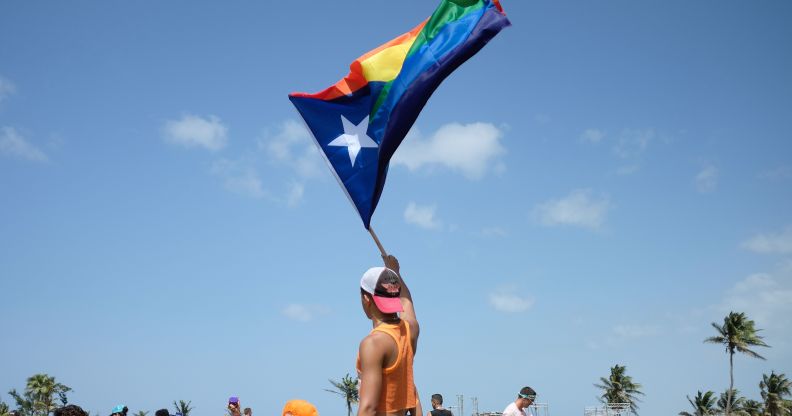Puerto Rico declares state of emergency as murders of trans people spiral out of control

People take part in the annual Gay Pride parade in San Juan, Puerto Rico, on June 3, 2018. (Ricardo Arduengo/AFP/Getty)
Puerto Rico governor Pedro Pierluisi declared a statement of emergency in the US territory Sunday (24 January) amid a spate of targeted killings against trans people as well as cis women.
Pierluisi, a member of the pro-statehood New Progressive Party sworn in earlier this month, announced the executive order that will provide sweeping protections against gender-based violence.
According to a news release from the governor’s office, the state of emergency will be in effect until 30 June, 2022.
“Gender violence is a social evil, based on ignorance and attitudes that cannot have space or tolerance in the Puerto Rico that we aspire to,” Pierluisi said in a statement.
“For too long vulnerable victims have suffered the consequences of systematic machismo, inequity, discrimination, lack of education, lack of guidance and above all lack of action.”
What does the order mean for Puerto Rico?
The order is, in part, the upshot of a years-long campaign from grassroots LGBT+ activists. Decision-makers have been pressured to take action against the rocketing rates of transphobic killings that seemingly show no signs of abating.
The various programs, they hope, will become a standard-bearer in a US grappling with dizzyingly high levels of violence against trans and gender non-conforming individuals.
Violence in Puerto Rico has only swelled during the coronavirus pandemic and in the rippling aftermath of Hurricane Maria, which devastated Puerto Rico in 2017.
The government plans to create the Committee for the Prevention, Support, Rescue and Education of Gender Violence, an agency which will provide services to people affected by domestic violence.
It will consist of 17 members including three representatives from gender-based violence service providers, gubernatorial agencies and those who work for nonprofits.

Puerto Rico’s new governor Pedro Pierluisi hopes the sweeping executive order will squash the swelling rates of gender-based violence. (Alejandro Granadillo/Anadolu Agency via Getty Images)
The committee will provide monthly updates on its progress following an initial report 45 days in.
A mobile app to allow victims to raise the alarm and request emergency services is also in the works, while a program to check in on women who have filed restraining orders and an educational media program will also be launched by the government.
But speaking to ABC News, some activists said they are wary that the state of emergency will not suddenly solve their problems.
“Fighting does work”, reflected Lourdes Inoa Monegro, the program director at Taller Salud which helps victims of gender violence. “This is a message that our claim was much needed.”
Monegro sought to stress, though, that the order tends to only “ambiguously” mention how the government will tackle transphobic killings in particular.
“We are interested in the steps,” Monegro said. “What is the timeline now? Now is when we get to work.”
Framed in headlights, a trans woman’s final moments were uploaded online and mocked.
The various and seemingly unrelenting killings of trans people, trans women in particular, in 2020 startled LGBT+ community leaders.
One flashpoint arrived in February, when homeless woman Alexa Negrón Luciano, a well-known figure on Puerto Rican social media, was shot to death. She was frequently sneered at by online trolls for her hunchbacked appearance and black tresses.
Framed in the headlights of a car and shot to death amid a cackle of laughter, Luciano’s final moments were uploaded in a vile video on social media.

Police are investigating the murder of the trans woman Alexa Luciano Ruiz in Puerto Rico. (Twitter/@DavidBegnaud)
“You bet I am going to go and shoot him,” said one of her suspected killers in footage police at the time confirmed was authentic.
Her final moments, activists warned, captured the apparent impunity anti-LGBT+ attackers feel in their crimes.
Months later, and a car, charred and deserted, was found by police. Another murder, the authorities said.
The joint slayings of Layla Peláez, 21, and Serena Angelique Velázquez, 32, two friends who lived in New York City, only chipped away further any feeling of safety trans people felt in Puerto Rico.
And in 2021, the violence continued. Samuel Edmund Damián Valentín, a young trans man, was the seventh trans person killed in the last 12 months, monitoring groups said.
Many of the cases echoed the brutal murder of gender-nonconforming teen Jorge Steven, found decapitated, dismembered and set ablaze in 2009.

